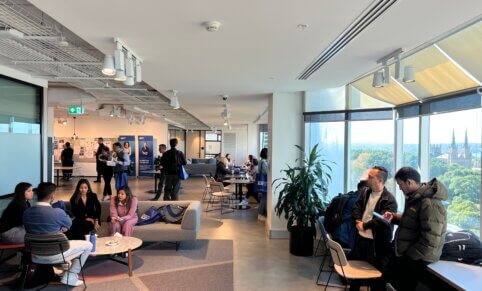These days, screens are a massive part of life. Whether you’re immersed in psychology, counselling or social work courses – or just getting lost in Netflix binges and endless Instagram scrolling, we’re all glued to our devices. But all that screen time comes at a price: screen fatigue.
It’s real and it’s not just about tired eyes – it can disrupt your focus, energy, sleep, and even your mood, impacting your performance. Even if you’re pursuing postgraduate study, such as a Master of Business Administration or a Graduate Diploma of Legal Practice, managing screen fatigue is crucial for maintaining your overall wellbeing and academic success.
In this guide, we’ll break down screen fatigue, what it’s all about, and how to kick it to the curb with some easy, fun tips that’ll make your screen time more bearable (and maybe even a little healthier!).
So, What Is Screen Fatigue?
Simply put, screen fatigue is the overwhelming tiredness you feel after spending too much time in front of a screen. It’s not just about tired eyes – although eye strain is a big part of it – it’s also about the mental and emotional exhaustion that comes with staring at a screen all day.
It’s a bit like computer vision syndrome (CVS), which is all about physical discomfort, like headaches, blurred vision and dry eyes. Screen fatigue goes a step further, throwing in bonus symptoms like mental fog, irritability and a low mood. And let’s face it, when you’re knee-deep in assignments or revision, the last thing you need is to feel more tired and overwhelmed than you already do.
Why Should You Care About Screen Fatigue?
Chances are you’re spending a huge chunk of your day on screens – whether it’s in lectures, typing up assignments or scrolling social media for a “quick” break (we all know that one).
So why does this matter? Because too much screen time can seriously affect your focus, mood and health. Whether it’s feeling like a zombie after endless study sessions or struggling with sleep because of blue light exposure, screen fatigue can sneak up on you and wreck your productivity.
Screen Fatigue vs Computer Vision Syndrome
So, what’s the difference between screen fatigue and computer vision syndrome (CVS)?
- CVS is about the digital eye fatigue that comes from staring at screens too long – think eye strain, headaches, dry eyes and neck pain. It’s usually caused by bad lighting, sitting too close to your screen or not taking enough breaks.
- Screen fatigue, on the other hand, is a bit broader. It includes all those physical symptoms, plus mental exhaustion, irritability and just feeling drained. It’s that full-body, full-mind fatigue that makes you want to throw your laptop out the window (but please don’t!).
The Real Effects of Too Much Screen Time
Let’s break down what too much screen time can do to your body and mind:
1. Mental and Emotional Health
Spending hours on social media or working non-stop can make you feel anxious, stressed or just plain low. Constantly comparing yourself to others online doesn’t help either – hello, imposter syndrome! Not to mention, it can make you feel isolated and disconnected from the real world.
2. Physical Strain
Your eyes take a beating, but it doesn’t stop there. Long hours slouched in front of your screen can leave you with a stiff neck, back pain and even headaches. Over time, it can lead to more serious issues, like weight gain or chronic muscle problems. Ouch.
3. Disrupted Sleep
Blue light is your body’s nemesis when it comes to sleep. Spending too much time on your devices before bed messes with your natural sleep cycle, making it harder to drift off. And if you’re not sleeping well, your mood and focus take a hit too.
Simple Hacks to Beat Screen Fatigue
If you’re looking for easy ways to beat screen fatigue, don’t worry, we’ve got you covered. There are plenty of ways to fend off screen fatigue and get back to feeling fresh, focused and in control of your screen time. Let’s dive into some tried-and-tested tips:
1. The 20-20-20 Rule
This one’s a lifesaver for your eyes. Every 20 minutes, take a 20-second break, and look at something 20 feet (about 6m) away. This gives your eyes a quick rest and reduces eye strain.
2. Tweak Your Screen Settings
Make sure your screen brightness matches the room you’re in – too bright, and it’ll strain your eyes; too dim, and you’ll squint. Also, turn on that blue light filter. Most devices have one these days and it’ll help keep your eyes happy (especially at night).
3. Blink More
It sounds silly, but when you’re focused on a screen, you blink less – leading to dry, irritated eyes. So, blink more! It’s a simple way to avoid that gritty, uncomfortable feeling that comes from staring at screens too long.
4. Create a Comfy Workspace
Your screen should be at eye level and your chair should support your back properly. Ergonomics matter! It’ll help keep your neck and shoulders from getting stiff. Also, make sure your room is well-lit to avoid glare.
5. Take Regular Breaks
Set a timer if you have to, but make sure you’re taking breaks. Get up, stretch, move around or go for a quick walk. Even a few minutes away from the screen can make a big difference to how you feel by the end of the day.
6. Ditch Screens Before Bed
Give yourself at least an hour of screen-free time before bed to help wind down. Instead of scrolling through TikTok or watching another episode of your favourite show, try reading a book or journalling to relax.
7. Get Outdoors
Whenever possible, step outside and soak up some natural light. Not only is it a great break from screens, but natural light helps reset your body’s internal clock and boosts your mood.
8. Balance It Out
Find some non-screen activities to break up your day. Whether it’s exercising, reading a physical book, cooking or chatting with a friend, mixing in screen-free moments can help balance out the digital overload.
9. Hydrate
Drinking water might not seem like a big deal, but it helps prevent dry eyes and keeps your body functioning at its best. Keep a water bottle nearby and sip regularly.
10. Use Artificial Tears
If your eyes are still dry despite all your best efforts, try using artificial tears or lubricating eye drops. They can work wonders for keeping your eyes comfortable during long screen sessions.
11. Limit Video Calls
Video calls can be exhausting – sometimes even more so than other screen tasks. If possible, switch to phone calls or emails to reduce the amount of time you spend glued to your screen.
12. Use Screen Readers or Audiobooks
Give your eyes a break by switching to audiobooks or using a screen reader for your course materials. You’ll still get the work done without staring at a screen the whole time.
We know screens are a huge part of life, especially when you’re studying. But too much of a good thing can be harmful. The key is to find balance.
By taking regular breaks, adjusting your screen settings and prioritising self-care, you can fight off screen fatigue and stay sharp – ready to ace that next assignment.










